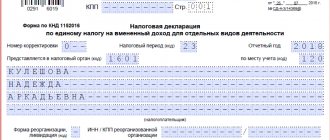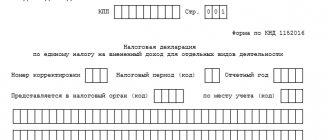A declaration is a tax reporting document that tax agents are required to provide within the deadlines established by law. This reporting format must be observed by all individual entrepreneurs operating under the Unified Tax on Imputed Income system. If an individual entrepreneur does not comply with the deadlines for submitting the UTII declaration, his actions are qualified as a direct violation of current legislation, which will lead to various negative consequences for the businessman.
Penalty for late submission of UTII reports
If a company (IP) is late in submitting the UTII declaration, this may entail liability.
In particular, the UTII payer may be fined. The penalty amount will be 5% of the tax that is not paid on time. Organizations and individual entrepreneurs that are payers of UTII must submit a declaration for this tax. Currently, the form approved by the order of the Federal Tax Service of Russia dated July 4, 2014 No. ММВ-7-3/353 is in force (clause 2 of the order of the Federal Tax Service of Russia dated December 22, 2015 No. ММВ-7-3/590).
The tax period for UTII is a quarter (Article 346.30 of the Tax Code of the Russian Federation). The declaration must be submitted to the tax authority no later than the 20th day of the month following the previous quarter (clause 3 of Article 346.32 of the Tax Code of the Russian Federation).
If the company (IP) is late in submitting the declaration, this may entail liability. In particular, the UTII payer may be fined. The penalty amount will be 5% of the tax that is not paid on time. A fine will be charged for each month of delay, regardless of whether it is full or not.
In this case, the fine cannot be more than 30% of the amount of tax not paid on time, but not less than 1000 rubles (Article 119 of the Tax Code of the Russian Federation). However, if the taxpayer has mitigating circumstances, the fine may be reduced (clause 1 of Article 112, clause 3 of Article 114 of the Tax Code of the Russian Federation).
In addition to a fine for late submission of the declaration, a company official may be held liable. He may be given a warning or a fine. The fine will be from 300 to 500 rubles (Article 15.5, Part 3 of Article 23.1 of the Code of Administrative Offenses of the Russian Federation).
In addition, the tax office may block the current account of a company that fails to submit its UTII return on time. This can happen if the period of delay exceeds 10 working days (clause 2 of article 76 of the Tax Code of the Russian Federation).
Submit your UTII reports without penalties and the first time through Kontur.Extern. Three months - free!
Try for free
Fine for non-payment of UTII
Judging by the question, are you an individual entrepreneur? Then, according to Art. 122 of the Tax Code of the Russian Federation, non-payment or incomplete payment of tax (fee) amounts as a result of understatement of the tax base, other incorrect calculation of tax (fee) or other unlawful actions (inaction) entails a fine in the amount of 20 percent of the unpaid amount of tax (fee), and if they were committed intentionally - 40 percent. This is for each tax period. All this is on top of the additional tax and penalties. It is also possible (depending on the specific situation) to apply Article 15.11 of the Code of the Russian Federation on Administrative Offenses: Gross violation of the rules for maintaining accounting records and submitting financial statements, as well as the procedure and terms for storing accounting documents, entails the imposition of an administrative fine in the amount of two thousand to three thousand rubles A gross violation of the rules of accounting and presentation of financial statements means: distortion of the amounts of accrued taxes and fees by at least 10 percent; distortion of any article (line) of the financial reporting form by at least 10 percent. To apply penalties (fines), the tax authority must prove your guilt in the offense.
What are the penalties for non-payment of taxes?
One of the most common economic crimes is tax evasion. Most often, the law is violated by organizations and individual enterprises, since they have greater opportunities to hide their real income. Ordinary people also evade paying taxes, if not completely, then at least partially.
Before you cross the line of the law, you need to know what penalties are provided for non-payment of taxes. Enterprises that do not pay taxes in full are trying to increase their profits in this way. The economic activities of such organizations are in the shadows. Ordinary people can evade taxes because they do not understand their necessity. Many people simply don't understand what they are getting in return. Since there are penalties and fines for non-payment of taxes, you should consider whether it is worth saving money in this way.
If the tax service discovers that an organization does not pay taxes, it sends a request specifying the payment deadlines. If the organization does not comply with the requirements, penalties will be applied. If the amount of unpaid tax is not too large, then the violator faces only financial losses. If the amount is large, then the debts can be collected from the property.
What is the penalty for non-payment of personal income tax?
Typically, the question of what fine is provided for non-payment of personal income tax is asked by individuals. Individuals must pay tax for the past period by July 15 of the current year. Penalties are provided if a person does not pay taxes on time. The fine is 20% of the amount that the person had to pay.
However, you should not rush to comply with the decision of the tax authority if the amounts of fines are large. You can use certain arguments that should help reduce the fine. If the taxpayer’s innocence can be proven, he will be released from liability. The taxpayer will not be held liable even if the statute of limitations has expired. For taxes, it is 3 years from the moment the tax period ended. We should not forget about such issues as violation of various formal procedures. If formalities are violated, the taxpayer may also be released from liability.
Often, fines for non-payment of personal income tax are reduced due to mitigating circumstances. These include family difficulties, health problems, the presence of dependent children and much more.
Example 1. Calculation of the statute of limitations
Let's look at a specific example.
The taxpayer did not pay UTII for the 1st quarter of 2021, that is, until April 25, 2021. In this case, the formation of the reporting period of limitation begins from 07/01/2021. During the period from 04/26/2021 to 07/01/2021, the tax office may hold the payer of an individual entrepreneur or legal entity liable for non-payment.
A bad debt to the budget is an amount that can be recognized by a court or for which the statute of limitations has passed.
Letter of the Ministry of Finance of Russia dated November 15, 2010 No. 03-02-08/80
What is the penalty for failure to pay a fine?
If the fine is not paid within the prescribed period, additional penalties will be applied to the violator. People often wonder what punishment awaits them for failure to pay a fine? If the fine is not paid on time, the amount will double. Car owners are most often interested in this question. The violator must pay the fine within a month, starting from the day it was issued. Although there is a penalty for failure to pay a fine, it can be avoided if you fail to pay on time.
Payment can be deferred for another 30 days. To do this, you must submit a special application to the traffic police. In case of difficult financial situation, the fine may be deferred for a period of 3 months. Deferring the payment of a fine for a long period is not so simple, since it will be necessary to prove financial insolvency. Various certificates may be required.
An administrative penalty cannot be imposed if the statute of limitations has expired. If 2 years have passed since the fine came into force, then the violator cannot be brought to administrative responsibility. Do not forget that the term could be interrupted if the violator evaded paying the fine.
What is the fine for non-payment of UTII
If an entrepreneur does not pay fixed contributions on time, he may be fined. A penalty will also be charged. The amount of fines and penalties depends on how much was not paid, as well as on how many days the delay is. This year, the same fines that were in effect last year remain. Many businessmen are wondering what the fine is for non-payment of UTII?
If the contribution is not paid on time, a fine will be imposed, the amount of which will be 20% of the unpaid contribution. If the entrepreneur did not pay taxes intentionally, the fine will be 40%. The question of what the penalty for failure to pay a fine is also of concern to entrepreneurs. A penalty is usually assessed for non-payment of contributions. It must be charged for each day of delay. All days are taken into account, not just working days. 1/300 of the amount is taken.
For a few days the penalties will not be large, but if the contributions have not been paid for a long time, the amount of the penalty will increase significantly. A penalty will be charged in any case if the payment was not timely. If contributions are paid later than the due date, a penalty will be charged automatically.
A fine will be assessed if arrears are identified during the inspection. The fine can be avoided if the payment of the contribution took place before the inspection, despite the fact that the deadline was violated. In this case, the entrepreneur will only have to pay a penalty.
It is worth understanding that penalties and fines are different sanctions and there is nothing in common between them. The penalty is calculated automatically, and the fine will be issued only if the audit reveals any arrears.
FAQ
Question No. 1. Is it difficult to prove that the delay in payment was “without intent?” Answer: yes. It is quite difficult to prove this option to the tax authorities; it is extremely rare. The only options are to present documents - evidence or the presence of an overpayment of taxes.
Question No. 2. What if the tax office did not count the overpayment for previous periods against upcoming payments, identified a delay, and assessed penalties and fines? In such a situation, you must immediately contact the Federal Tax Service office with a personal visit with evidence of the existence of an overpayment; you will have to write a letter about offsetting the overpayments against upcoming payments. In such a situation, penalties and fines will most likely be removed.
Fine for late submission of UTII declaration
The legal fact that serves as the basis for beginning to monitor compliance with the deadlines for submitting tax calculations and tax returns by taxpayers as provided for in tax legislation is the arrival of the legally established deadline for submitting the relevant reports to the tax authority.
It is worth noting that on the part of the tax authorities, inspectors daily reconcile the list of taxpayers who have not submitted one or another tax reporting with the reporting actually submitted for the day.
A tax return (calculation), as well as documents that, in accordance with tax legislation, must be submitted along with a tax return, can be submitted by taxpayers to the tax authorities:
1). On paper:
-personally or an authorized representative (representative);
-by post, with a mandatory description of the attachment.
2). If the number of employees is more than 100 people, then taxpayers have an obligation to submit reports to the tax authority via TCS communication channels.
Failure to comply with the procedure for submitting tax reports in electronic form entails a fine (in the amount of 200 rubles) in accordance with Article 119.1 of the Tax Code of the Russian Federation. At the same time, proceedings in the case of tax violation provided for in Article 119.1 of the Tax Code of the Russian Federation are carried out in accordance with Art. 101.4 Tax Code of the Russian Federation.
Mitigating and aggravating circumstances: what are they for the taxpayer?
Among the mitigating options, the legislation provides for a number of situations:
- a combination of difficult personal (family) circumstances;
- violation under the influence of threat or official dependence;
- difficult financial situation of the taxpayer;
- presence of dependents;
- complex health conditions;
- other similar factors.
In a situation where the payer has at least one of these circumstances, the fine may be reduced by 2 times.
Important! The taxpayer will have to prove the possibility of using this or that situation to reduce the amount of the fine formally, with documents. If this is, for example, a serious illness, then certificates from a medical institution and a certificate of the operation performed are required. Perhaps there was a situation where it was necessary to leave the country due to some circumstances; in this case, a document is presented confirming the need for such departure.
Among the aggravating circumstances, one is provided:
- repeated similar offense within 1 year.
Failure to submit tax reports on time - fines
Failure to comply with deadlines for submitting tax reports to the tax authorities, or failure to submit them at all, is often tolerated by taxpayers. One of the reasons for missing the deadline is a change in the tax reporting template, or a change in the order of its submission.
Do not forget that if the last day for filing reports falls on a Sunday or a non-working national holiday, then it is shifted to the next working day following this weekend or holiday (Clause 7, Article 6.1 of the Tax Code of the Russian Federation).
IMPORTANT! In the absence of tax activities that do not involve non-submission of reports in the absence of an object of taxation, a zero tax return must be submitted. Its absence will entail a fine of 1,000 rubles. (letter of the Ministry of Finance dated October 7, 2011 No. 03-02-08/108).
Violation of the deadlines for submitting declarations (calculations) entails the imposition of penalties in the amount of 5% of the unpaid amount of tax subject to payment (additional payment) on the basis of this tax document (declaration), for each full or partial month from the day established for its submission, but no more 30% of the specified amount and not less than 1000 rubles, according to Article 119 of the Tax Code of the Russian Federation.
In addition to penalties for violating the deadlines for submission, which are established by the Tax Code, fines are also provided for by the Administrative Code of the Russian Federation, which must be paid by officials responsible for the timely submission of tax reports (declarations) Article 15.5 of the Code of Administrative Offenses of the Russian Federation. Penalties vary from 300 to 500 rubles, or an administrative penalty in the form of a warning may be imposed.
Also, tax authorities can send a notification to the bank about blocking an existing current account for late submission of tax returns (clause 3 of Article 76 of the Tax Code of the Russian Federation). The account is blocked if tax reporting is not submitted within 10 days after the expiration of the deadline for submission. The tax authorities block all accounts opened at the time of the account analysis.
Is it possible to avoid sanctions?
The question of whether it is possible to avoid punishment in the form of a fine is of interest to absolutely all taxpayers. An expert from the legal aid center answers:
“We all go to the doctor only when the disease has already taken us by surprise, but no one thinks about disease prevention. Very often, the “imputed people” carry out their activities independently, without the involvement of competent personnel responsible for the correct filling out and deadlines for submitting the UTII declaration. This leads to problems with late submission of reporting documentation to the Federal Tax Service. If you have already allowed a similar situation to occur, take care of your business reputation in advance and immediately contact the tax authorities with an appropriate explanation, which should set out the reasons for the current situation. If the Federal Tax Service considers the reasons to be valid, and you have evidence corresponding to this, then penalties can be avoided. However, business should be conducted in such a way that violation of deadlines is excluded from the established tax reporting procedure.”
Svetlana Kotlakova, expert at the center for legal support of entrepreneurs “Business Consult”
In a word, penalties can be avoided if you approach the issue responsibly. The deadline for contacting the tax office with an explanation is 5 days from the date of violation of the deadlines for the UTII declaration.
The UTII declaration form is filled out
When applying the taxation system, in the form of paying a single tax on imputed income (UTII), income in this case is determined in accordance with Article 346.26 of the Tax Code of the Russian Federation. Declaration form, approved by order of the Federal Tax Service of Russia dated July 4, 2014 No. ММВ-7–3/ [email protected]
In the UTII tax return on line_100 “Tax base” of section 2 “Calculation of the amount of single tax on imputed income for certain types of activities”, this is considered imputed income in accordance with Art. 346.29 Tax Code of the Russian Federation. If the taxpayer uses several types of activities, then a separate sheet of Section 2 is filled out for each type and, accordingly, income is calculated in total and for all 4 quarters of the reporting tax period.
The tax base for UTII-imputed income is calculated using the following formula:
VD = BD X FP amount X K1 X K2, where:
VD - imputed income;
BD - basic profitability;
FP - physical indicator;
K1 and K2 are correction factors.
The amount of single tax is calculated using the following formula:
Single Tax = (N/base * 15% (or a reduced rate according to the regulatory documents of the constituent entity of the Russian Federation) - Insurance premiums.
Violation of the deadlines for submitting a tax return for a single tax entails the imposition of penalties in the amount of 5% of the unpaid amount of tax subject to payment (additional payment) on the basis of this tax document (declaration), for each full or partial month from the day established for its submission, but not more than 30% of the specified amount and not less than 1000 rubles, according to Article 119 of the Tax Code of the Russian Federation.
There is no point in case of untimely submission of reports, i.e. The approach to everyone is the same, to those who were overdue for one day and those who didn’t even think about it, say a month.
For example, if the taxpayer not only delayed the submission of the declaration, but also did not pay the tax, then the amount of penalties will be correspondingly greater.
Important features of declaration
If a single tax payer has ceased his activities, but has not been deregistered, he is not exempt from filing a declaration. For individual entrepreneurs and organizations on UTII registered as special regime taxpayers, it is not permitted to:
- failure to submit a quarterly declaration form to the fiscal authority;
- submitting a document with zero indicators.
An entrepreneur or organization is considered deregistered only after submitting the appropriate application:
- for individual entrepreneurs – UTII form-4;
- for organizations - UTII form-3.
If the company ceased operations in the middle of the tax period, then the tax is calculated taking into account the basic profitability for the full month.
An important feature is that the imputed tax is calculated taking into account possible income from a certain type of activity. Actual income does not play any role, even if the company operates at a loss. Taxpayers are required to pay a fixed amount of UTII and report this to the tax authorities.
Sample of filling out UTII-2 for individual entrepreneurs 2017
What does tax legislation provide for failure to file a return?
The sanctions that the tax office may apply if it does not receive the required report on time are prescribed in Art. 119 of the Tax Code of the Russian Federation. The exact amount of the fine that will be established depends not only on the submission of the declaration (calculation), but also on the actual payment of the amount of tax due under this declaration to the budget:
- If the tax due for the period was fully transferred to the budget by the payment deadline, and only the declaration was “late,” the fine will be at least 1,000 rubles. The same liability occurs if the zero declaration is not submitted on time.
- If neither the declaration was submitted nor the tax was paid, a fine will be charged on the entire amount of tax not received by the budget in the following order: 5% of the amount of unpaid tax for each month of delay (full or incomplete). This means that even if there is a delay of several days, there is already one incomplete month.
- The total amount of fines can be a maximum of 30% of the amount of unpaid tax, but not less than 1000 rubles. That is, a fine of 5% can be charged for each of the 6 months from the date of delay. If the taxpayer manages not to report and pay for a longer period, the fine will still be 30%.
In addition, penalties will be charged for the tax underpaid to the budget in its own way, according to Art. 75 of the Tax Code of the Russian Federation, regardless of whether any other sanctions were applied to the taxpayer or not.
Reasons for blocking a bank account
- non-payment (incomplete payment) of personal income tax on salaries, bonuses, fees to freelancers and other payments to individuals (70% of companies whose accounts were blocked);
- very fast (within a few hours or minutes) withdrawal of money from accounts after they are received (55% of companies);
- working with unreliable counterparties (50% of companies);
- being in the “red zone” for taxes. Those. taxes were paid in amounts not comparable with the scale and type of business (45% of firms);
- the organization is on the black list, that is, on the list of companies that have already had problems according to the Federal Service for Financial Monitoring (38%);
- payment of VAT in insufficient amounts (35%);
- negative rating for cash withdrawals. Those. companies rented significantly more than similar companies did (9% of firms).
Note: Accounts were blocked only if the company met not one, but several criteria for dubiousness.
What sanctions are imposed for failure to submit a report on time under the Code of Administrative Offenses of the Russian Federation?
Violation of tax laws entails not only tax sanctions, but also administrative liability. In case of failure to submit a tax return, the provisions of Art. 15.5 Code of Administrative Offenses of the Russian Federation.
According to Art. 15.5 of the Code of Administrative Offenses of the Russian Federation, officials (responsible for submitting reports and paying taxes) may be given a warning or imposed a fine, which ranges from 300 to 500 rubles for each violation.
NOTE! According to the Code of Administrative Offenses of the Russian Federation, fines must be paid within 60 days from the date of the decision on the offense. Such fines in case of non-payment may be collected through the courts. If the case is about non-payment of a fine under the Art. 15.5 of the Code of Administrative Offenses of the Russian Federation has reached the court, then by decision of the judge another fine may be collected, 2 times the original amount, but not less than 1000 rubles. The following may also be prescribed:
- administrative arrest for up to 15 days;
- forced community service lasting up to 50 hours.
It should be remembered that in certain cases (resulting in a shortfall in tax receipt by the budget in an amount defined as particularly large), in addition to administrative liability, criminal liability may also be applied.
You can find out in detail what and when criminal liability is imposed on negligent taxpayers in our section.
Results
For failure to submit any declaration on time, including the UTII declaration, a number of measures are provided for the taxpayer:
- tax sanctions;
- administrative sanctions;
- criminal sanctions in certain cases;
- other enforcement measures, for example, blocking bank accounts or presenting for tax payment based on a desk audit without a declaration.
Therefore, in order to avoid falling under this set of measures, it is recommended to submit UTII declarations in a timely manner.
Find out more about how to prepare and when to submit a UTII declaration and what the nuances of settlements with the budget may be in this special mode from our section.
Sources:
- Tax Code of the Russian Federation
- Code of Administrative Offenses
You can find more complete information on the topic in ConsultantPlus. Free trial access to the system for 2 days.
What additional measures may be applied to those who do not submit UTII reports?
For those who do not submit their UTII reports on time, general additional measures may be applied. Among other things, first of all, you should remember about blocking the bank accounts of an unscrupulous taxpayer.
The ability for tax authorities to block bank accounts is provided for in Art. 76 Tax Code of the Russian Federation. If the submission of the declaration is overdue by more than 10 working days after the filing date established by law, the tax office has the right to send to the banks where the taxpayer is serviced a decision to suspend transactions on his accounts.
Transactions are blocked in the expenditure part (that is, money will be credited to the account, but the taxpayer will not be able to use it). When blocking, the following nuances are taken into account:
- The account is blocked without prior notification to the taxpayer. The Federal Tax Service did not support the idea of warning about blocking (see letter from the Federal Tax Service dated July 28, 2016 No. AS-3-15 / [email protected] ).
- In case of blocking due to failure to submit a declaration, the account may be blocked without any limitation on the blocked amount, that is, on the entire amount in the account or credited to the account. This position was once supported by the Ministry of Finance (see, for example, letter of the Ministry of Finance dated April 15, 2010 No. 03-02-07/1-167).
- The exceptions available for debiting from a blocked account are payments that, in order of priority, must go through before tax payments: 1 - payments based on court decisions in compensation for harm to life and health, as well as payments for alimony obligations;
- 2 - calculations for severance pay and wages paid according to executive documents;
- 3 - salary payments to employees with whom employment contracts have been concluded, as well as contributions to compulsory insurance from these salaries;
- 4 - other payments under executive documents (not included in groups 1 and 2);
- 5 - tax payments themselves and everything else that was not included in the previous items on the list; the rest can no longer be paid from a blocked account.
Secondly, it should be mentioned that in the event of failure to receive a declaration from the taxpayer, the Federal Tax Service may initiate tax calculation using its data. Namely, to conduct a desk audit without a declaration. In this case, activity on UTII is a very suitable case for such a check, since the tax is calculated based on the amounts imputed to the calculation, and not on actual income. That is, a UTII payer who has not provided a calculation will be required to pay to the budget the amount that the tax office itself will calculate. Moreover, if the payer does not submit his version of the calculation in the declaration, the result of the desk audit will become mandatory for him to carry out.
For more information about what a cameral without a declaration is, read: “Art. 88 Tax Code of the Russian Federation (2016): questions and answers.”






